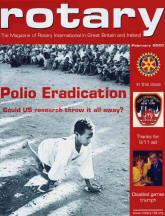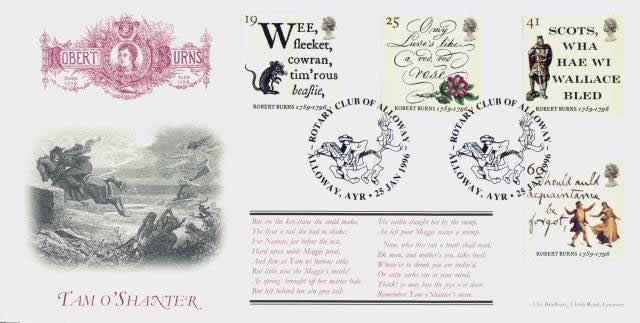On January
25th many Rotary Clubs around the world will hold a Burns
Supper and enjoy eating the traditional Scottish meal of haggis, neeps
and tatties, the drinking of whisky, and the recitation of works by,
about, and in the spirit of Scotland’s National Bard – Robert Burns.
At this
time, I wonder how many of you realise a special Rotary connection with
Burns? It is more than simply the traditional singing of the Burns song
‘Auld Lang Syne’ at the end of Conferences and Conventions; it is
more profound.
Robert
Burns was Rotary founder,
Paul Harris’ favourite poet. Forget for a moment the annual
RI Presidential themes, Harris believed that Burns' work – ‘A Man's a
Man For A' That’ -gave to us all a simple yet definitive Rotary
philosophy based around our common humanity.
In his
1935 book ‘This Rotarian Age’, he once said (in his unmistakeable
prose style) of Burns' poem, " In the compass of these words have been
found all the philosophy, all the hope, the substance of every prayer of
the first seer, but how vain were the aspirations and hopes of this
widely separated twain. Primordial forces were to be reckoned with, as
is also the case even now though generations have lived and died since
the lips of the sage of Ayr were sealed in death."
Harris
would also go on to say, "When I think of Burns I see the thing we are
striving for in Rotary - The Brotherhood of Man". He further explained
Burns' part in the genesis of Rotary:
"Centuries later was born in Scotland another who lived in advance of
his time, one who stoutly refused to do obeisance to unreasoning
precedent; one whose soul overflowed with the poetry of life. Of all the
words of the Scottish bard, none will be more highly appraised nor
longer remembered than..."(Harris continues by quoting the final verse
of ‘A Man’s A Man For A’ That’).
Then let us
pray that come it may,
(As come it will for a' that,)
That Sense and Worth, o'er a' the earth,
Shall bear the gree, an' a' that,
For a' that, an' a' that,
It's coming yet for a' that,
That man to man, the world o'er,
Shall brithers be for a' that."
In his
1935 book, Harris also used a verse of Burns 'Address to the Unco
Guild' as an introduction to his third chapter entitled
'The Cradle of Religious Liberty'.
In
another reference to the National Bard, Harris wrote “It should all do
us good once in a while to see ourselves as others see us…”
One
co-incidence between both men was that their respective wives were both
called Jean. Robert Burns married Jean Armour in 1788. Like Jean Harris,
Burns father came from Kincardineshire. The following Burns poem to his
wife was one of Paul Harris' favourites.
"Of a'
the airts the wind can blaw
I dearly like the west
For there the bonnie lassie lives
The lassie I lo'e best;
There wild woods grow and rivers row
And monie a hill between;
By day and night my fancy's flight
Is ever wi'my Jean
Next column
(Top)
|
There's not
a bonnie flower that springs
By fountain, shaw or green;
There's not a bonnie bird that sings
And mins me o' my Jean"
Harris
visited Ayr in Scotland, Burns' birthplace, in 1928 and returned a few
years later to see the newly formed Rotary Club of Ayr and often
hypothesised over what a wonderful Rotarian Burns would have made. On
this Scottish leg of his tour Paul also visited the Rotary Club of
Glasgow, where he was clearly moved by a rendition of ‘Auld Lang Syne’
and remarked to the Club President that it would be a lovely gesture for
the Club to sing "Should Auld Aquaintance be forgot..." to all visiting
Rotarians. The President replied with a frosty disdain "We dinna sing
songs like that for everyone"!
The Bard
of Ayr's influence on the small town New England world of the young Paul
Harris can also be illustrated by looking at the poem entitled
‘Robert Burns’ by Henry Wadsworth Longfellow. Here's a brief
extract:
"But still
the music of his song
Rises o'er all elate and strong;
It's master-chords
Are Manhood, Freedom, Brotherhood,
Its discords but an interlude
Between the words."
Recently, thanks to the sterling work and dedication of Californian
Rotarian Art McCullough, a radio broadcast of a Paul Harris radio
address has allowed the Rotary world to hear the voice of The Founder
via the web at www.rotaryfirst100.org.
Paul
Harris’1933 speech at the International Convention in Boston, USA to
non- Rotarians everywhere is truly inspirational. Harris quotes Burns’
poetry and tells us that the words of the “Bard of Ayr” are as relevant
today as they were when written over one hundred years earlier. “If you
have the love of your fellow man in your hearts”, he declares, “then you
are potential Rotarians”.
Enjoy
your Burns Supper!
Calum Thomson
Rotary Club
of Longniddry and District (District 1020)
Researcher
for
Rotary Global History
Paul Harris makes note
of Burns in a 1933 radio address during the Rotary convention in Boston,
MA, USA. That address and written comments can be found at the following
"History" link.
/1910harris/paulharris/1933.htm

This
article, by Calum Thomson, appeared in the February 2003 issue of ROTARY
in the UK
|



